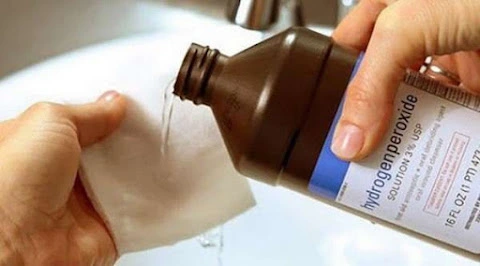20 Health Benefits Of Hydrogen Peroxide You Didn’t Know
Do you think that hydrogen peroxide is of little use? Have you ever wondered why it is not advertised and why it is intentionally kept practically in oblivion? Well then, be surprised. Simply washing your toothbrushes and gargling with hydrogen peroxide will drastically reduce any type of flu. Here are some tips or advice that can help our health a lot:
1. Health Of Teeth And Gums
For the health of your teeth and gums, put the contents of the cap of the hydrogen peroxide bottle in your mouth, swish for 10 minutes, and spit. You can do this daily while bathing. In this way, you can heal injured, inflamed, and/or ulcerative gums. In addition, your teeth will look whiter without the need for special and expensive kinds of toothpaste, you can use cheap hydrogen peroxide instead of very expensive mouthwash.
2. Makes Toothbrushes Germs Free
To keep toothbrushes free of germs and bacteria, always keep them in a glass of hydrogen peroxide.
3. Germs Cleaner
Clean tables and counters or counters with hydrogen peroxide, both to kill germs and to leave a fresh smell. Simply put some hydrogen peroxide on the cloth, scouring pad or jargon with which you wash the dishes and clean the dishwasher, the counter, the tables, the keys, etc.
4. Kills Bacteria
After rinsing the cutting board, pour in a little hydrogen peroxide to kill salmonella and other bacteria.
5. Eliminates Fungus
To eliminate foot fungus, spray a 50% mixture of peroxide and water on them, especially on the big toes and wait for them to dry.
Did you Know?
Hydrogen Peroxide was first discovered by the French chemist Louis Jacques Thénard in 1818.
6. Soaks Any Infection Or Cuts
Soak any infection or cuts in 3% hydrogen peroxide for 5 to 10 minutes several times a day. The husband of Becky Ransey, a doctor with more than 36 years practicing medicine, experienced cases of gangrene that did not clear up with any treatment and that healed with continuous peroxide treatment.
7. To Avoid Vaginal Infection
If you use a device for vaginal douching, put two caps of hydrogen peroxide with water to avoid vaginal infections or urine. This can be done twice a week.
8. To Disinfect Bathrooms
Fill a spray bottle with a 50% mixture of peroxide and water to spray the bathrooms and disinfect them without damaging the septic system with other strong disinfectants such as chlorine, ammonia or muriatic acids.
9. Helps In Flu
When you suffer from cold and stuffy nostrils, put your head in a horizontal position and spray a 50% mixture on your nose and throat to kill bacteria. Hold the position for a few minutes and then blow your nose and spit the mixture out.
10. Eliminates Toothache
If you suffer from tooth or toothache and cannot go to the dentist right away, swish a 3% solution for 10 minutes several times a day. The pain will decrease considerably.
Health Precaution
Avoid Ingestion of Hydrogen Peroxide
A crucial health precaution when using hydrogen peroxide is to avoid ingesting it. Swallowing hydrogen peroxide can lead to irritation of the gastrointestinal tract, chemical burns, and potentially more severe health issues. If accidental ingestion occurs, seek immediate medical attention.
11. For a Natural Look Of Hair
And of course, if you want a natural look for your hair, spray a 50% solution on damp hair after washing and brush it out. You won’t get the exaggerated blonde from the models that come in the factory dye boxes, but you will get natural highlights if your hair is light brown, bleached, or gray. As you gradually clarify, the change will not be very drastic.
12. Eliminates Boils On the Skin
Pour half a bottle of peroxide into the water when you take a bath to help eliminate fungi and boils on the skin. Hydrogen peroxide’s gentle antiseptic properties can alleviate discomfort and promote faster healing, particularly for individuals prone to skin issues.
13. Cleanses Clothes
You can also add a peroxide cap to laundry in place of bleach. In cases of bloodstains on clothing, pour the peroxide directly on the stain, leave it for a minute, and then rub and rinse with cold water. If necessary, repeat the procedure. Its stain-removing prowess extends to wine, ink, and food stains, making it a valuable asset for preserving your favorite garments.
14. Mirror Cleaner
Use it to clean mirrors, as they are impeccable. Hydrogen peroxide effortlessly eradicates smudges and toothpaste splatters while leaving behind a gleaming, streak-free shine, ensuring a crystal-clear reflection.
15. To End Flu
Gargle with hydrogen peroxide put drops in the ear and nose to end colds, flu, and sinusitis (including polyps), and use it to wash vegetables or to kill bacteria and neutralize their chemicals.
16. Sanitize your Kitchen
Sanitize your dishwasher or refrigerator. Incorporating hydrogen peroxide into your appliance cleaning routine enhances the overall cleanliness of your home.
17. Plants Friendly
Use it on trees and plants as a natural fungicide, or insecticide, and to dry out the weed. Gardeners and plant enthusiasts can harness the potential of hydrogen peroxide as a natural fungicide, insecticide, and growth booster. Dilute hydrogen peroxide with water (typically a 1:10 ratio) and spray it on your plants to combat fungal diseases, discourage pests, and promote healthy growth.
18. Cleanse Your House
Clean your house with hydrogen peroxide when it is invaded by fungi because of the humidity caused by leaks or leaks in the sinks, zinc, or toilets. Mold growth in damp areas of your home, such as basements, bathrooms, and kitchens, can be a persistent challenge. Hydrogen peroxide is a safe and effective solution for tackling mold problems. Mix a 3% hydrogen peroxide solution with water (usually a 1:1 ratio) and apply it to affected surfaces using a spray bottle or sponge. This not only kills existing mold but also prevents it from returning. Regular use in areas prone to moisture-related mold can help keep your home clean, safe, and free from the harmful effects of mold spores.
19. Safer Than Chlorine
All over the world hydrogen peroxide is used in place of chlorine as a safe and ecologically friendly water purifier by municipal authorities. Municipal authorities worldwide employ hydrogen peroxide as a safe and eco-friendly alternative to chlorine for water purification. It ensures cleaner, safer water supplies.
20. To Disinfect Pools
Some use H202 in pools and spas. For pool and spa owners, hydrogen peroxide can serve as an alternative disinfectant, offering a gentler option compared to traditional chemicals.
And so, you could continue discovering more uses for hydrogen peroxide. What’s recommended is that no house lacks several bottles of this affordable solution that can be used for so many things.
Safety Precautions When Handling Hydrogen Peroxide
- Avoid Ingestion: Do not swallow hydrogen peroxide. Ingesting it can lead to chemical burns and other health issues.
- Avoid Eye Contact: Prevent hydrogen peroxide from coming into contact with your eyes. If it does, rinse your eyes immediately with plenty of water and seek medical attention if irritation persists.
- Ventilation: Use hydrogen peroxide in a well-ventilated area to disperse any fumes and prevent inhalation of vapors.
- Dilution: When using concentrated hydrogen peroxide, always dilute it to the appropriate concentration for the intended purpose. Follow instructions carefully.
- Protective Gear: Wear appropriate protective gear such as gloves and safety goggles when handling hydrogen peroxide, especially in higher concentrations.
- Storage: Store hydrogen peroxide in a cool, dark place away from heat sources and direct sunlight. Keep it tightly sealed in its original container.
- Keep Away from Children: Store hydrogen peroxide out of reach of children to prevent accidental ingestion or misuse.
- Corrosive Materials: Keep hydrogen peroxide away from flammable and combustible materials, as it can react with some substances and cause fires.
- Stability: Do not mix hydrogen peroxide with other chemicals unless you are following a specific, approved procedure. Mixing with incompatible substances can result in hazardous reactions.
- First Aid: Familiarize yourself with appropriate first-aid measures in case of accidental exposure. This includes knowing how to rinse skin or eyes and when to seek medical attention.
- Labeling: Clearly label containers that hold hydrogen peroxide, including the concentration and any specific instructions for use.
- Dispose Properly: Follow local regulations for the safe disposal of hydrogen peroxide containers and solutions. Do not pour it down drains without proper dilution or treatment.
- Emergency Numbers: Keep emergency contact information, including poison control, readily available in case of accidents or exposure.

